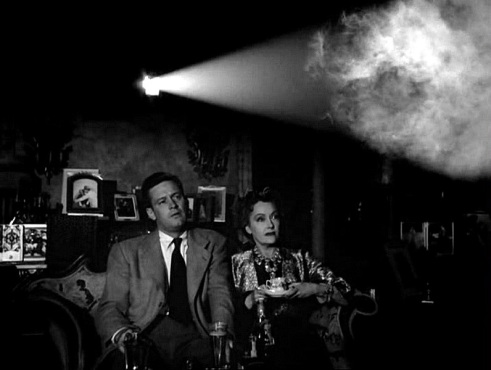
Joe Gillis (William Holden) and Norma Desmond (Gloria Swanson) yearning for the Hollywood spotlight in Sunset Boulevard.
I remember seeing The Last Picture Show for the first time in junior high and thought it was boring and morally degrading. I saw it a second time near the end of my senior year in high school and was compelled by it. It was a film about a period of life, which includes relationships, the local movie theater, past transgressions, coming to a bittersweet close. You kind of have to live a little and mature a little (and I mean this in the most chaste way possible because I didn’t really live at all in high school) in order to appreciate the rich themes conveyed in that film.
We all grow up. Sometimes, we don’t even notice until our tastes have gone surprisingly awry.
I remember seeing Sunset Boulevard when I was 13 or 14 (probably around the same time I first saw The Last Picture Show) and not really enjoying it at all. I found it rather grim and boring. I just saw it last night, before bed, and it was one of the most rewarding cinematic experiences I’ve been through. I’m still thinking about it. I’m still haunted, still enthralled by it. I want to re-watch it, but I’ve convinced myself that my time could be better wasted (i.e. writing this thing).
I don’t know what changed. I still don’t know how it feels to be a silent film actress trying to make a comeback in a talkie-infested Hollywood. I haven’t had to work in the film industry, though I suppose I have read more about the film industry since I last saw this film. However, I think it’s that I simply have a greater, deeper appreciation for a well-written film that I didn’t possess before.
I envy the writers–Charles Brackett, Billy Wilder, D.M. Marshman–for being able to write such a brilliant, witty, bitingly funny script, with such satirical, yet honest insights on Hollywood, tight, fast-paced plotting and dialogue, and wonderful characters. And Wilder never gets enough retrospective credit for being a great director–not as just an actor’s director, but a Great Director. While he’s been known to shun the intentional technical spectacles of his contemporaries, complaining that they’re distracting to storytelling, his films remain so eloquently made, with great detail attended to the set, the costumes–the general atmosphere of it all.
Think of the scenes in Norma Desmond’s own version of Satis House. The only things that are missing are the spider webs and the wedding cake–the madness is still ever so present. Think of that scene when Norma Desmond visits Cecil B. DeMille’s film set and how light is so expertly used. Norma sits down and she’s in the dark, until she’s noticed by the lights guy, who slowly shines the light on her once again, attracting the attention of the actors on the set–and once the lights disappear, the fans disappear also, making that scene so harshly symbolic of the fallen star’s career. Even think of Joe Gillis and Betty Schaefer (Nancy Olsen) at the New Year’s Eve party and how their faces barely touch–but it’s hotter than any forcibly erotic film scene from the past 10 years. Wilder can capture them all–the highs, the lows–his camera is always keenly observant and aesthetically marvelous.
And I can refer to Norma and Joe with such ease, despite the fact that the actors certainly have distinct identities of their own. Gloria Swanson and William Holden are certainly not unknowns. Yet, they embody their characters so well–Swanson as the delusional has-been silent film star, so eager for her comeback, or “return” as she would prefer, and Holden as the desperate (but handsome) Hollywood screenwriter trying to help her out, until he realizes that she can’t be helped. Swanson and Holden are fabulous in their roles, embodying their characters with such energy and pinache. Swanson, with her exaggerated silent film star facial expressions, is so close to self-parodying, but self-aware enough to not be. Holden’s voice-over narration, in typical Wilder fashion, is a treat.
At the heart of the film is Erich von Stroheim’s Max von Mayerling, as Norma’s director/husband turned servant/chaffeur, who feeds her delusion by writing her fan letters. He loves her, so he tries to protect her from herself–hides things from her, makes things up to please her–but tragically, heartbreakingly, he’s perpetrating the lie that goes on and on and on. He’s a willing participant–or is he still the director of it all? The ending begs those questions.
It’s hard to write anything on Sunset Bouleveard that hasn’t been written already. However, it’s important to note that this film is still being written about. I initially wondered whether or not that was ignorant to say, but think about the classic films that are being still extensively written about, talked about, studied, and seen by people–it’s a mere handful compared to how many pictures Hollywood churned out back in the days. Many have been forgotten or lost. Sure, there are surviving films that are deemed classics, but even the Great Films don’t necessarily age that well–as much as I love Gone with the Wind, I would be lying if I said that it has aged perfectly. But Sunset Boulevard probably remains as fresh and exciting as it was when it was first released in 1950. And that could easily be said about many of Wilder’s films–The Apartment, Some Like It Hot, Double Indemnity. All really fantastic, timeless films.
So if you’ve never seen Sunset Boulevard, see it. If you have, see it again. Hollywood has always liked making films about themselves, but this is the queen bee of that genre. No other film about Hollywood has been so willing to be both a brutal critic and an affectionate fan of that absurdly royal machinery.